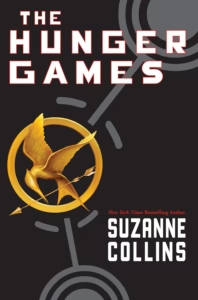The Hunger Games (The Hunger Games #1)
Suzanne Collins
Scholastic Press
Published September 14, 2008
Amazon | Bookshop | Goodreads
About The Hunger Games
The nation of Panem, formed from a post-apocalyptic North America, is a country that consists of a wealthy Capitol region surrounded by 12 poorer districts. Early in its history, a rebellion led by a 13th district against the Capitol resulted in its destruction and the creation of an annual televised event known as the Hunger Games. In punishment, and as a reminder of the power and grace of the Capitol, each district must yield one boy and one girl between the ages of 12 and 18 through a lottery system to participate in the games. The ‘tributes’ are chosen during the annual Reaping and are forced to fight to the death, leaving only one survivor to claim victory.
When 16-year-old Katniss’s young sister, Prim, is selected as District 12’s female representative, Katniss volunteers to take her place. She and her male counterpart Peeta, are pitted against bigger, stronger representatives, some of whom have trained for this their whole lives. She sees it as a death sentence. But Katniss has been close to death before. For her, survival is second nature.
My Review
My favorite thing about The Hunger Games is the balance between Katniss and Peeta. Katniss is a survivor. She’s strong and clever with traps and snares but emotions totally mystify her. Peeta’s work at the bakery affords him physical strength, but his real asset in the Games is his intuition, his understanding of others, and his strength of heart. Those two need each other if they have any hope of surviving in the arena.
While the plot moves quickly and the threat of death keeps readers on the edge of their seats, the story’s real victory is its unforgettable characters. Rue, the clever, young tribute Katniss watches in training, and Cinna, her compassionate costume designer and unexpected ally, remain my favorites.
While it’s very accessible for young readers in other ways, The Hunger Games, as you might imagine from the description, has some strong violence which may make it the wrong pick for younger or more sensitive readers. My daughter has been asking to read Divergent, which has more violence and some sexual content, which I’m not sure she’s ready for, so reading The Hunger Games was an alternative I felt more comfortable with, and which still let her into a book on the young adult spectrum. We read the book together and sometimes stopped to talk about what was happening.
The Hunger Games Movie
After reading the book, my daughter and I watched the movie together. It does have some brief, mild profanity, and of course, gives visual to the violence depicted in the scenes of the book. The movie stays pretty true to the spirit of the book, though it does streamline and minimize some things. For instance, instead of Katniss listening to hours of a tribute being tortured, she quickly ends his life in an act of mercy.
Content Notes
Recommended for Ages 12 up.
Profanity/Crude Language Content
None.
Romance/Sexual Content
Kissing. A couple spends nights together, but usually one or other is gravely injured, and at any rate, no mention of anything sexual happening.
Spiritual Content
None.
Violent Content
Strong violence. Tributes actively try to kill one another with weapons and traps. An older teen kills a younger one with a spear. A girl kills opponents with knives. Mutant wasps kill and wound others. A boy bashes another tribute’s skull in with a rock. Genetically mutated monsters which appear to be some kind of human/dog hybrid chase tributes, torturing one they catch. (Katniss describes hearing the pained sounds of the victim for hours, but can’t see what’s happening.)
Drug Content
Katniss samples wine with her dinner. Her mentor, Haymitch, abuses alcohol. He stumbles about drunk and at one point collapses into his own vomit.
Note: I purchased a copy of this book. All opinions are my own. This post contains affiliate links which cost nothing to use but help support this blog. Thanks for using them to do your shopping!
Post updated 9/30/2025.
Save
Save
